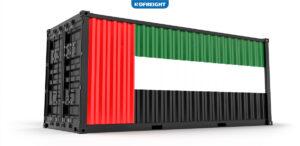Since the beginning of time, humans have looked up at the stars and dreamed of traveling to them. In the last century, we have made that dream a reality. Space travel has come a long way in a short amount of time. We have gone from the Wright brothers’ first flight to putting a man on the moon. We have sent probes to Mars and telescopes to Pluto. We have even sent people to space stations orbiting Earth. Space freight may soon be as common as air freight. This blog post discusses the significance of the first Emirati astronaut’s trip to the International Space Station (ISS) and its impact on the UAE’s development.
Table of Contents
Freight Industry’s Journey
The freight industry has come a long way since its early days. In the early days of freight, there were few regulations and little infrastructure to support the movement of goods. This made freight a risky and unpredictable business. As the world economy grew, so did the freight industry. More and more goods needed to be transported to meet the demands of a growing population. This led to the development of better infrastructure and more regulations to make freight more reliable and safe.
Today, the freight industry is a vital part of the global economy. It moves billions of dollars worth of goods annually and plays a crucial role in the worldwide supply chain. The industry has come a long way from its early days, and it is only expected to grow in importance in the years to come. We will trace the development of the freight industry from its early days to the present and discuss the significant changes that have occurred over time and the factors that have driven these changes.
The freight industry originated in the early days of trade and commerce. As early as the Bronze Age, people transported goods long distances. The first evidence of freight transport is in the form of pottery shards found in Mesopotamia that date back to 3000 BC. These shards show that early civilizations already used carts and wagons to move goods around.
- Development of the wheel: This allowed the construction of larger and more efficient carts and wagons. The first evidence of wheeled freight vehicles comes from a painting in an Egyptian tomb that dates back to 2500 BC. This painting shows men loading a cart with goods.
- Animals: This allowed for much heavier loads to be moved and helped speed up goods transport. The first evidence of animal-powered freight transport comes from an Assyrian relief from 675 BC that shows donkeys being used to pull carts.
- Sailing Ship: This allowed for transporting goods over long distances without the need for animals. The first evidence of sailing ships being used for freight transport comes from an Egyptian painting from 1450 BC that shows ships carrying grain.
- Railway: This allowed for transporting goods over long distances at high speeds. The first railways were built in the United Kingdom in the early 1800s.
- Automobile: This allowed for transporting goods over shorter distances at high speeds. The first automobiles were built in Germany in the late 1800s.
- Airplane: Transport of goods over long distances at very high speeds. The first airplanes were built in the United States in the early 1900s.
The future of freight is always challenging to predict. However, a few trends suggest that the industry will continue to grow in importance.
- First, the world economy is expected to continue to grow. This will lead to increased demand for freight services.
- Second, the development of new technologies will continue to improve the efficiency of freight transport. This will allow freight companies to move more goods at lower costs.
- Third, developing new markets will create new opportunities for freight companies. This will allow them to expand their operations into new areas.
- Fourth, the consolidation of the freight industry is expected to continue. This will lead to the creation of larger and more efficient freight companies.
Overall, the future of the freight industry looks bright. The industry is expected to continue to grow in importance as the world economy expands.
Space Travel
Humans have long been fascinated by the idea of space travel. For centuries we have looked up at the stars, dreaming of visiting them. In the last few hundred years, our technology has advanced to the point where space travel is now possible. There are many different ways to travel through space. The most common is by rocket. Rockets are propelled by a powerful engine that burns fuel. This fuel is usually a mixture of chemicals, such as liquid oxygen and kerosene.
Another way to space travel is by using a spacecraft. A spacecraft is a vehicle designed to carry people or cargo into space. It is usually much larger than a rocket and has a power source, such as a nuclear reactor.
Space travel is a fantastic feat of human engineering. It allows us to explore the universe and discover new worlds. It also presents some challenges, such as how to protect astronauts from the harsh conditions of space. But with continued research and development, we will overcome these challenges and open up the universe to explore. As the demand for space travel increases, so does the request for freight services to transport materials and supplies to support space exploration. The freight industry plays a vital role in space travel, and the two sectors are interconnected in many ways.
Space Freight
Given the rapid modernization of industries and the need to use technology, we at DFreight have coined the term “space freight.” The future of space travel looks very promising. With the help of private companies, space travel is becoming more affordable and accessible. In the next few years, we will see more people going to space for tourism, research, and even to live. The possibilities are endless, and the sky is no longer the limit. As a result, it is better to plan ahead of time for the day when we will require space transportation services; maybe you need to send your furniture to another planet; rest assured, we have prepared a comprehensive guide for you!
The UAE Way to Space
The Mohammed bin Rashid Space Centre (MBRSC) and Axiom Space have signed a memorandum of understanding to cooperate on developing a space program for the United Arab Emirates (UAE). The agreement will see the two entities working together on the feasibility of a UAE space program, focusing on human spaceflight. The partnership between MBRSC and Axiom Space is an important step forward for the UAE space program and will help to ensure that the program can achieve its goals. The agreement between the two entities will help to ensure that the UAE space program can benefit from the experience and expertise of both organizations.
Sultan Al Neyadi is an astronaut selected for this long-duration space mission.
Grow With Technology
The use of technology in industries has led to increased productivity and efficiency. Automation has replaced many manual tasks, and computer-controlled machines can now perform tasks that would have been impossible. This has reduced the amount of time and resources required to produce goods and services. In addition, technology has allowed companies to communicate and collaborate more effectively, further increasing productivity.
Technology has revolutionized the freight forwarding industry. In the past, freight forwarders relied on manual processes and paper-based documentation. This was time-consuming and often resulted in errors. Today, freight forwarders are using technology to streamline their operations. Automation is now used to track shipments, create documentation, and even book appointments. This has resulted in a more efficient and accurate system and has allowed freight forwarders to scale their businesses. As you can see, continuing to use traditional methods in industries will cost you in a world where space tourism will soon be the norm.
DFreight is a digital freight forwarding platform that allows users to book and manage shipments online. The platform provides users access to a network of carriers, allowing them to compare rates and transit times to find the best shipping option for their needs.
FAQs
What are the risks of space travel?
There are many risks associated with space travel, including radiation exposure, microgravity-induced health problems, and the risk of collisions with space debris.
What are the challenges of space travel?
Space travel poses many challenges, including the need for expensive and complex technology, the risk of human error, and the challenges of living and working in space.
What are the critical components of the UAE space travel program?
The critical components of the UAE space travel program include the development of a space launch facility, the construction of a space station, and the development of a Mars exploration mission.














